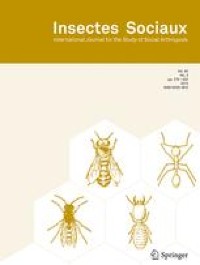In this paper, they show how small insects reared in a very simple chamber can survive in it as long as insects that are kept in a more traditional enclosure.
The figure of their chamber with 10 nests is this one:

A hole is made to the bottom of a petri dish, a peice of plaster placed such that it covers the hole, and a piece of sponge is used to connect the plaster to a water reservoir underneath. The connection to the water reservoir ensures that the ants have continuous access to water through the moistened plaster, while preventing the ants from accidentally drowning. In the petri dish, there is also a dark plastic film that the ants can use for cover.
The paper shows that ants can do well in this easy-to-care for chamber, and so this type of chamber can be used for experimental observations.
Very interesting. I might try to copy the water part next time I want to DIY a formicarium, then I can just fill a tub when it is low instead of swapping out test tubes and stuff.
also, would this community be ok with talking about hobby ant keeping as well? or should I find another one?
They may live the same age, but do they die happy, bored, or depressed?
I had the same thought.
I don’t know. I think that lifespan is probably used as a metric when it comes to insects because it is probably difficult to measure other parameters. I suspect that short-term stress can be quantified by looking at how much the insect is moving, but after the burst of activity dies down the insect could still be stressed. Maybe the underlying idea is that insects that are under high-stress will tend to have shorter lifespans, and so we can infer that long-lived insects are happy. This doesn’t only have moral implications, but also from the point of the view of the reliability of the experiments the researcher would want stress-free animals.
I don’t know if insects express strong molecular markers of stress (like cortisol) and I wonder how hard it would be quantify that. Ants are quite small, so I can image collecting stress hormones might be tricky. And the ants will probably be stressed in the process… It is a good question.
Maybe they could bridge it to a conventional one and let the ants choose. If most ants choose the conventional side most of the time, then something is up




